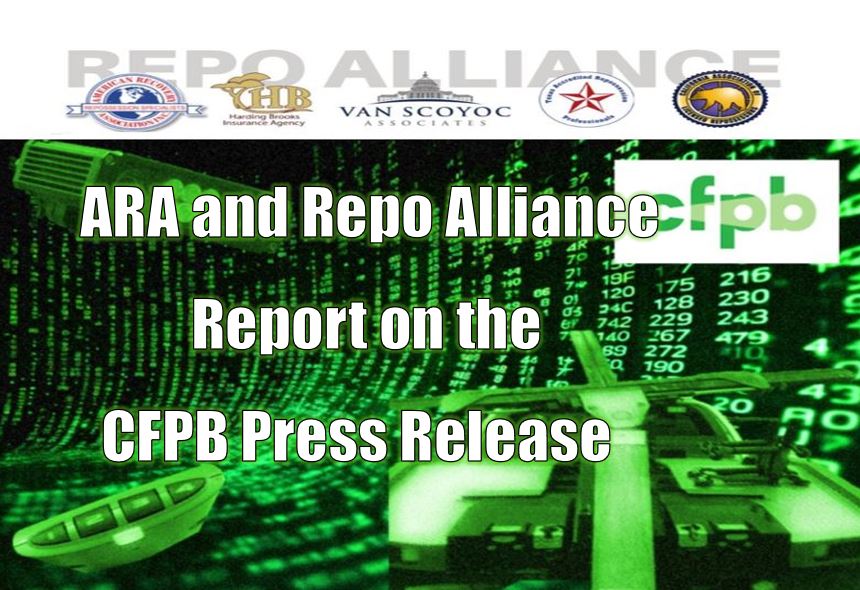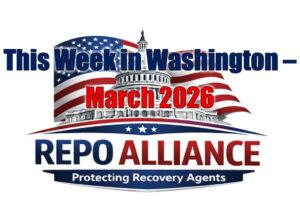ARA and Repo Alliance Report
On January 23, 2025, the CFPB released information they garnered from nine (9) financial institutions, discussing current conditions and trends in the automotive space. The data covered the years 2018-2022.
The results:
- Repossessions surpassed pre-pandemic rates by the end of 2022.
- In the month of December 2022, 0.75% of all outstanding vehicle loans were assigned to repossession – a 22.5% increase from December 2019 (0.61%).
With pandemic supply chain issues, the cost of new and used vehicles skyrocketed, putting consumers in a precarious position with vehicle debt. Today, vehicle prices have begun to normalize, leaving those who bought vehicles during the supply chain interrupted period in an inverse value position.
The current director of the CFPB sees repossession as a major life disruption to consumers, affecting their ability to maintain employment, which in turn affects every aspect of their ability to function and support families.
Outside of housing debt, auto loans represent the largest amount of consumer debt. The report states there are over 100 million active auto loans and $63 billion in new monthly loan originations as of April 2024.
Lenders have increased their use of third-party forwarders from 31% in 2018 to 66% in 2022.
The use of forwarders increases the cost of repossession, which is a burden on consumers.
Deficiency balances in 2019 were averaging $10,000.00. These outstanding balances saw a short-lived reduction, but as of 2022 increased to $11,000.00. This once again has the propensity to harm consumers’ credit scores, affecting their ability to obtain new credit or increase interest rate charges.
Additional information from Van Scoyoc and Associates indicates many key matters pertaining to auto finance and repossessions are subject to CFPB rules and regulations. Current CFPB Director Rohit Chopra does not plan to resign under the Trump presidency. He plans to fulfill the rest of his term through 2026.
However, President Trump has the authority to remove Chopra based on a recent Supreme Court decision. Though Trump has not floated the name of a possible replacement, VSA believes it is nearly certain Trump will remove Chopra very soon into his presidency. As of this report, Chopra continues as director.
Beyond naming a new director, Trump plans to move forward on major changes at CFPB, with or without Congressional involvement. We expect Trump to work with Congress to reform CFPB. Trump and many congressional Republicans have long wanted to change CFPB’s structure and funding sources.
As you may recall, CFPB is funded through a 10% set-aside in the fees financial institutions pay to the Federal Reserve, thus is exempt from annual appropriations provided by Congress. The Supreme Court upheld this arrangement in 2024. But Republicans hope to change the CFPB structure so it must request funding from Congress annually. Further, Republicans are considering replacing CFPB’s director with a commission.
Both of these changes are intended to subject CFPB to more political pressures from elected officials. Further, both would require Congress to pass a law, which is not easy. This type of legislation would require Democratic support in the Senate. This means it is unlikely Congress will pass legislation changing CFPB.
Because of this, even if Trump and Congressional Republicans fail to advance legislation to reform CFPB’s leadership structure and funding stream, Trump will have the ability to change CFPB with the next director (whoever that may be). Trump’s new director would assuredly take a less active role in regulating financial markets. In the first Trump term, interim director Mick Mulvaney of CFPB instituted a hiring freeze and suspended any pending regulations or rules.
At the time, Trump urged financial regulation to be a state-based matter of governance. VSA anticipates the next CFPB leader will take a similar approach in the second Trump administration.
Though many anticipate actions that favor financial institutions in the Trump administration, Trump stated that he supports capping credit card interest rates at 10%. How committed Trump is to upholding that pledge remains to be seen. But more broadly, Trump’s position on credit card rates demonstrates that he will not be 100% aligned with financial institutions if the issue impacts the daily lives of Americans.
This stance is further swayed by House and Senate Republicans who are encouraging President Trump and the incoming leader of CFPB to remain laser-focused on protecting Americans from debanking and potential abuses from lending giants.
ARA and the Repo Alliance will continue to communicate directly with the CFPB and congressional leaders on issues of concern to our industry. Look forward to additional information as the Trump administration takes hold and additional policy changes begin to take form.
Download the Entire Report Here!












More Stories
Repo Alliance – This Week in Washington – March 2026
Royal Key Supply Announces Kevin Zwahlen as Account Executive – Repossession Sector
CALR Meets with State Repossession Regulators
Powering Smarter Recoveries, Vendor Safety and Faster Workflows
Take the Survey: Tell RDN What Recovery Pros Need Most
One Year Later: How Real-Time Communication Is Keeping Recovery Agents Safer